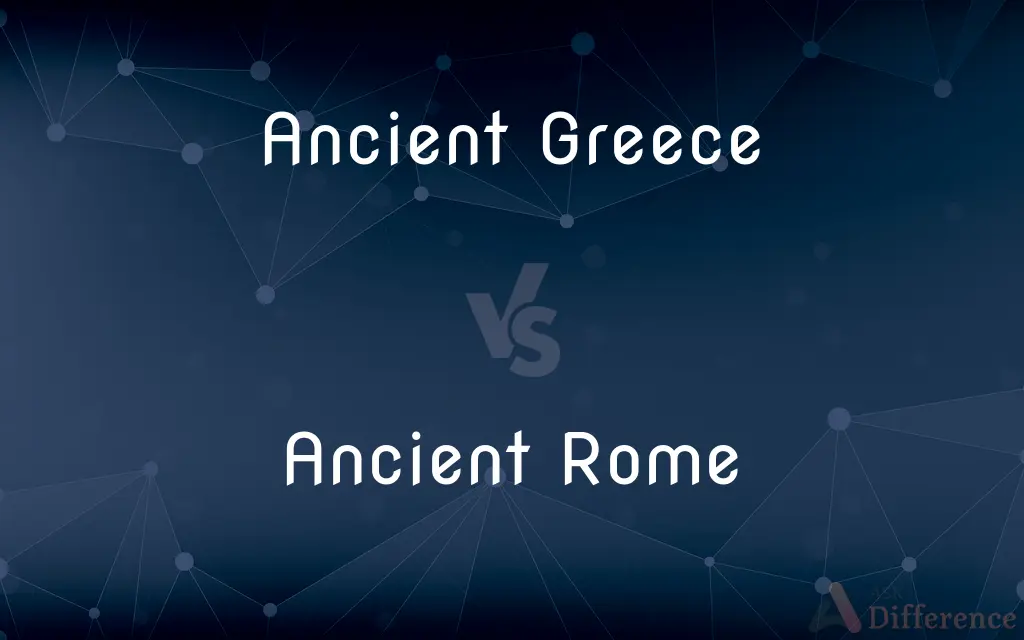Ancient Greece vs. Ancient Rome — What's the Difference?
By Urooj Arif & Maham Liaqat — Published on March 9, 2024
Ancient Greece, known for its city-states and philosophical achievements, contrasts with Ancient Rome's vast empire and legal legacy, highlighting their unique contributions to civilization.

Difference Between Ancient Greece and Ancient Rome
Table of Contents
ADVERTISEMENT
Key Differences
Ancient Greece and Ancient Rome are two of the most influential civilizations in history, each leaving a distinct mark on the development of Western culture, politics, and society. Ancient Greece, flourishing from around the 8th century BC to the end of antiquity, is celebrated for its pioneering contributions to democracy, philosophy, science, and the arts.
Ancient Rome, on the other hand, emerged from the Italian Peninsula, growing from a monarchy (around the 8th century BC) to a republic, and then to an expansive empire that dominated the Mediterranean and beyond until the 5th century AD. Rome's legacy is vast, encompassing the development of law, engineering, and military structures that influenced the subsequent European history.
Both civilizations made strides in artistic and architectural achievements, but Greek art emphasized ideals of beauty and harmony, evident in their sculptures and buildings, such as the Parthenon. Roman art and architecture, while influenced by Greek traditions, were more focused on practicality and the grandeur of the empire, as seen in the Colosseum and the extensive road networks.
The Greek emphasis on philosophical inquiry and the pursuit of knowledge contrasted with the Roman focus on legal order and governance. However, the Romans greatly admired and absorbed Greek culture, incorporating Greek gods into their pantheon and Greek philosophy into their education system.
Despite their differences, the interplay between Greek and Roman civilizations shaped the development of Western civilization, merging Greek philosophical and cultural achievements with Roman political and legal structures to lay the foundations of the modern world.
ADVERTISEMENT
Comparison Chart
Government
City-states with various forms of governance, including democracy in Athens
Monarchy, then Republic, then Empire with a strong central government
Contributions
Democracy, philosophy, science, Olympic Games
Legal systems, engineering, military innovations
Culture
Emphasis on philosophy, arts, and sciences
Emphasis on law, governance, and practical engineering
Architecture
Temples and buildings reflecting harmony and beauty, e.g., the Parthenon
Grand structures for utility and empire, e.g., aqueducts, Colosseum
Philosophy
Socratic method, exploration of ethics, politics, and metaphysics
Adopted Greek philosophy, focusing on practical applications in law and governance
Legacy
Foundations of Western philosophical thought and artistic ideals
Foundations of Western legal systems and political administration
Art
Idealized forms, striving for perfection and balance
Realistic portraits, monumental architecture to display power and grandeur
Influence on the West
Direct influence on art, science, and political thought
Roman law, governance, and infrastructure as the backbone of Western civilization
Compare with Definitions
Ancient Greece
Birthplace of democracy and Western philosophy.
Ancient Greece's democracy in Athens influenced modern democratic systems.
Ancient Rome
Integrated and expanded upon Greek culture.
Rome adopted Greek gods, renaming Zeus as Jupiter.
Ancient Greece
Known for its city-states and classical art.
The city-state of Sparta exemplifies Ancient Greece's diverse political landscapes.
Ancient Rome
Established extensive legal and administrative systems.
Ancient Rome's legal codes influence today's legal frameworks.
Ancient Greece
Emphasized ideals of beauty and harmony.
The Parthenon remains a symbol of Ancient Greece's architectural achievements.
Ancient Rome
Laid the groundwork for Western civilization's structure.
The Roman Republic's governance model influenced modern political systems.
Ancient Greece
Cultivated the study of philosophy and knowledge.
Socrates and Plato from Ancient Greece laid the groundwork for Western philosophical thought.
Ancient Rome
Known for its empire and architectural feats.
The Colosseum symbolizes Ancient Rome's architectural and engineering prowess.
Ancient Greece
Pioneered in science and the arts.
Greek contributions to geometry and drama are foundational to Western culture.
Ancient Rome
Advanced in military and engineering innovations.
Roman aqueducts illustrate their engineering skills and practical mindset.
Common Curiosities
How did Ancient Rome benefit from Ancient Greek culture?
Rome absorbed Greek culture, adopting its gods, art, literature, and philosophy, enriching Roman culture and education.
What are some architectural achievements of Ancient Greece and Rome?
Greece is famed for the Parthenon, embodying ideal beauty, while Rome is known for practical structures like the Colosseum and aqueducts.
Which civilization came first, Ancient Greece or Ancient Rome?
Ancient Greece predates Ancient Rome, with Greek culture flourishing centuries before Rome's rise to prominence.
How did Ancient Greece's government differ from that of Ancient Rome?
Greece was made up of independent city-states with various forms of governance, including democracy, while Rome transitioned from a monarchy to a republic and then to an empire with a strong central government.
Did Ancient Greece and Ancient Rome have the same gods?
The Romans adopted Greek gods but renamed them; for example, Zeus became Jupiter, and Hera became Juno.
What legacy did Ancient Greece and Ancient Rome leave for Western civilization?
Greece provided the foundation for Western philosophical thought and artistic ideals, while Rome laid the basis for legal systems, political administration, and infrastructure.
What is the main difference between Ancient Greece and Ancient Rome?
Ancient Greece is known for its philosophical and artistic achievements in a city-state system, whereas Ancient Rome is recognized for its imperial expansion and contributions to law and governance.
Can the fall of Ancient Greece and Ancient Rome be attributed to similar reasons?
Both civilizations faced internal strife and external pressures, but the specifics of their declines are unique to their historical and political contexts.
How did the philosophies of Ancient Greece and Rome differ?
Greek philosophy explored ethics, politics, and metaphysics, while Roman philosophy, influenced by Greece, focused more on practical applications, especially in law and governance.
Why is Ancient Rome considered more influential in legal matters?
Rome's codification of laws and development of legal principles have had a lasting impact on Western legal systems.
Share Your Discovery

Previous Comparison
Central Government vs. State Government
Next Comparison
Mycelia vs. HyphaeAuthor Spotlight
Written by
Urooj ArifUrooj is a skilled content writer at Ask Difference, known for her exceptional ability to simplify complex topics into engaging and informative content. With a passion for research and a flair for clear, concise writing, she consistently delivers articles that resonate with our diverse audience.
Co-written by
Maham Liaqat












































